KARACHI: Pakistan and Saudi Arabia this week agreed to put a $1.2 billion Saudi oil facility into operation at the “earliest,” allowing Islamabad to defer payments for oil imports that economic experts hope will help stave off a current account crisis.
The $4.2 billion Saudi support package, which included a $1.2 billion oil loan facility, was agreed during Prime Minister Imran Khan’s visit to Riyadh in October last year. In December, Pakistan received the $3 billion loan but the oil loan facility is yet to be put into use.
On Thursday, the Saudi Ambassador to Islamabad Nawaf bin Said Al-Malki and Pakistan’s federal minister for economic affairs, Omar Ayub Khan, met to discuss the facility.
“During the meeting, it was agreed to operationalize the Saudi Oil Facility at the earliest,” the Pakistani side said in a statement.
The financing agreement for the oil facility was signed last November between the Saudi Fund for Development and the Pakistani Economic Affairs Division.
“As per Financing Agreement, the SFD will extend the financing facility up to $100 million per month for one-year for purchase of petroleum products on deferred payment basis,” the statement added.
Pakistan is facing a wide range of economic challenges, with high inflation, sliding forex reserves, a widening current account deficit and a depreciating currency.
Pakistan’s current foreign reserves declined to $22 billion, including $15.7 billion held by the central bank as of the week that ended Jan. 28, according to central bank data.
Economists hope the early operationalization of the Saudi oil facility will help improve the country’s “external payment position.”
“Operationalizing this facility would help Pakistan to contain an increase in its current account deficit,” Dr. Abid Qaiyum Suleri, a member of Pakistan’s Economic Advisory Council, told Arab News on Friday. “This would in turn help retain foreign exchange reserves. The result would be improvement in (the) current account deficit and a stable rupee.”
The decision on the early operationalization of the oil loan comes as the International Monetary Fund announced this week that its Executive Board had approved a $1 billion disbursement to Pakistan after completing a sixth review of the country’s reforms under its $6 billion loan program.
The disbursement brings Pakistan’s total draw against the Extended Fund Facility program for budget support to about $3 billion. The program was initially approved in July 2019.
The IMF said the program had strengthened Pakistan’s fiscal buffers before the start of the COVID-19 pandemic, and a strong economic recovery has taken hold since the summer of 2020.
But it warned that a widening current account deficit and currency depreciation had reinforced domestic price pressures.
Pakistan’s GDP growth is expected to reach 4 percent this year, but its economy remains vulnerable to flare-ups of COVID-19, tighter international financial conditions, a rise in geopolitical tensions and delayed implementations of structural reforms, the IMF said.
Oil rises further above $90, headed for seventh weekly gain as freezing weather strikesWith hundreds of millions in deals LEAP shows Saudi momentum in tech advances is paying off

